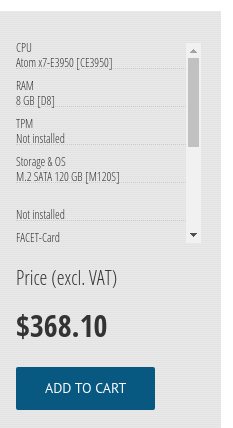Hey…
I researched both the fitlit2 and the supermicro. I notice these devices use the Atom embedded server chips. Typically at minimum 4C/4T. ECC Memory support, an extremely low TDP, and a bunch of the intel advanced technologies.
I priced a fitlit spec’d with:
Atom x7-CE3950
8GB Ram
M.2 Sata 120Gb
Standard case and options
$368.10 excluding Taxes, Customs, Etc.
Doesn’t seem to outperform my i3 build, but the i3 build only cost about $55 more. Am I missing something or do I have a flawed line of thinking with this so far?
The supermicro server MSRP’s over $500.00 for barebones and over $1,000.00 for a complete system. Uses an Atom Embedded server chip (C3558 4C/4T 2.20Ghz and a stunning 16watt TDP).
Again, it appears the i3 10100 build outperforms this system for a lower price point. The only advantage of the Atom chip over the i3 chip is the TDP, ECC Memory support, and larger Cache.
I also like the fact the i3 build can be easily upgraded with a full-featured case/mobo. If I put in 8Gb ram now, I can add 8Gb more later. If I put an i3 10100 in now, I can add a more powerful processor (LGA1200 which includes i5’s, i7’s, and even i9’s Comet Lake.) Icould even buy a cheap i5-K Version and Overclock it. This way, it doesnt require such an up front out of pocket cost.
I am vehemently trying to find the flaw in my logic in thinking with the responses when I research the suggestion. I have no idea the solutions to my problem that exists in the ether and enjoy each suggestion as I research them and learn about new products and companies.
Though, I am human and could miss something like maybe the i3 doesn’t support a feature required, AES-NI as an example. In this case, the i3 10100 supports AES-NI and I think most if not all processors for the last several years do.
I’m trying to move away from UI/UniFi as I am not happy with their AP or Networking performance. So looking to replace my unifi stack, router, switch, AP’s.
My current issue with prosumer/soho switches.
With Unifi Switches, they are designed to integrate into the unifi network. Of course they can be used stand-alone. However, while UI does an excellent job releasing firmware, especially for older products, the firmware always appears to have a bug or flaw. They fix one bug, create five more. Or, my favorite advertise a product has a feature that is actually in beta and never works correctly and refuses to fix it for years if ever (IPV6 Ba Dum Tss). I don’t want to spin up a controller to change settings in my switch. And they’ve taken the cisco route of renaming standards or making options confusing. Custom support doesnt exist, RMA procedure for me has been a dream and a nightmare. Nothing is consistent about Unifi but its inconsistent. The prices however are amazingly cheap for what is offered when compared to competitors.
If I were to use UI for networking, it would be their edgemax line with UISP/UNMS.
Looking at Aruba, the switch has local management, but their AP’s must be managed through the cloud.
This appears to be the way companies are going, even ubiquiti with the UDM/P.
So, I’d hate to get the Aruba switch and then another brand AP.
I’ve been looking at the grandstream products, especially their AP’s. Current testing (not by me) show they out perform Ubiquiti for the same price point. But their routers and switches are table top made specifically for home users/ISP.
TP-Link makes decent switches, but as a core switch I don’t feel totally safe using them. They rarely update firmware, patch it, etc. I have TP-Link switches with firmware from several years ago. I highly doubt they made perfect hacker-proof, flaw proof firmware that doesn’t even require some patching. I use several of their 8 ports to extend wired outlets for smart home things like T.V,s, Rokus, etc. I am not worried about the switches within the network getting exploited, if they do, it means the network was exploited already.
I’ve used Netgear’s, but their interfaces are clunky and slow and cartoonish/cheap feeling. I guess the devices themselves route traffic okay, but I hate using their interfaces. I do like it is an American Company, at least my understanding is it is American based.
I am thinking of the edge max and Aruba switches with grandstream AP’s. But, I’m still researching, digging through Reddit, Spiceworks, and more. Asking questions, getting opinions and advice.
Happy Sunday.
Feel free to point out where I may error in my thinking, comparisons, etc. I honestly do enjoy research people’s suggestions and comparing them to what I would/am going to do.
/finn

